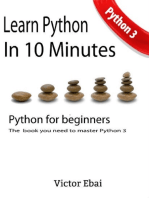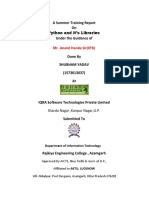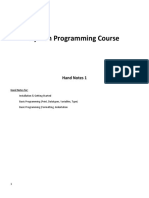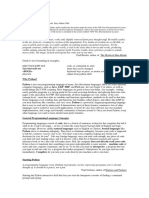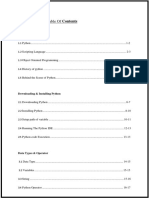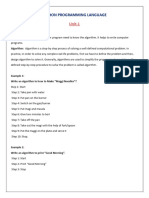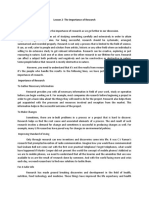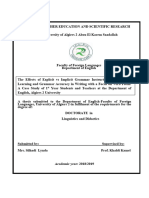Python Tutorial_ History and Philosophy of Python
Uploaded by
SentinelPython Tutorial_ History and Philosophy of Python
Uploaded by
SentinelPython Course
Home Python 2 Tutorial Python 3 Tutorial Advanced Topics Numerical Programming Machine Learning Tkinter Tutorial Contact
Next Chapter: Starting with Python: The Interactive Shell
History of Python
Easy as ABC
Follow Bernd Klein,
What do the alphabet and the programming language Python have in common? Right, both start with ABC. If we are talking about ABC in the Python context, it's clear that the
the author of this
programming language ABC is meant. ABC is a general-purpose programming language and programming environment, which had been developed in the Netherlands,
Python 3 website, at Google+:
Amsterdam, at the CWI (Centrum Wiskunde & Informatica). The greatest achievement of ABC was to influence the design of Python.
Bernd Klein on
Tutorial Google
Python was conceptualized in the late 1980s. Guido van Rossum worked that time in a project at the CWI, called Amoeba, a distributed operating system. In an interview with
The Origins of Bill Venners1, Guido van Rossum said: "In the early 1980s, I worked as an implementer on a team building a language called ABC at Centrum voor Wiskunde en Informatica Bernd Klein on
Python (CWI). I don't know how well people know ABC's influence on Python. I try to mention ABC's influence because I'm indebted to everything I learned during that project and to Facebook
Starting with the people who worked on it."
Python: The
Interactive Shell Later on in the same Interview, Guido van Rossum continued: "I remembered all my experience and some of my frustration with ABC. I decided to try to design a simple Search this website:
scripting language that possessed some of ABC's better properties, but without its problems. So I started typing. I created a simple virtual machine, a simple parser, and a
Executing a
simple runtime. I made my own version of the various ABC parts that I liked. I created a basic syntax, used indentation for statement grouping instead of curly braces or begin-
Script Go
end blocks, and developed a small number of powerful data types: a hash table (or dictionary, as we call it), a list, strings, and numbers."
Indentation
Data Types and This topic in German
Variables / Deutsche
Comedy, Snake or Programming Language
Operators Übersetzung:
Geschichte und
Sequential Data So, what about the name "Python": Most people think about snakes, and even the logo depicts two snakes, but the origin of the name has its root in British humour. Guido van Rossum, the creator of Python, wrote Philosophie von
Types: Lists and in 1996 about the origin of the name of his programming language1: "Over six years ago, in December 1989, I was looking for a 'hobby' programming project that would keep me occupied during the week around Python
Strings Christmas. My office ... would be closed, but I had a home computer, and not much else on my hands. I decided to write an interpreter for the new scripting language I had been thinking about lately: a descendant
List of ABC that would appeal to Unix/C hackers. I chose Python as a working title for the project, being in a slightly irreverent mood (and a big fan of Monty Python's Flying Circus)."
Python 3
Manipulations
Shallow and
This is a tutorial in
Deep Copy The Zen of Python Python3, but this
Dictionaries chapter of our course
Sets and Frozen Beautiful is better than ugly. is available in a
Sets Explicit is better than implicit. version for Python
Simple is better than complex. 2.x as well: History
An Extensive
Complex is better than complicated. and Philosophy of
Example Using
Flat is better than nested. Python in Python 2.x
Sets Sparse is better than dense.
input via the Readability counts.
keyboard
Book a
Special cases aren't special enough to break the rules.
Dedicated
Conditional Although practicality beats purity.
Errors should never pass silently.
Course
Statements
Loops, while Unless explicitly silenced.
In the face of ambiguity, refuse the temptation to guess. The goal of this
Loop
There should be one -- and preferably only one -- obvious way to do it. website is to provide
For Loops educational material,
Although that way may not be obvious at first unless you're Dutch.
Difference allowing you to learn
Now is better than never.
between Although never is often better than *right* now. Python on your own.
interators und If the implementation is hard to explain, it's a bad idea. Nevertheless, it is
Iterables If the implementation is easy to explain, it may be a good idea. faster and more
Output with Print Namespaces are one honking great idea -- let's do more of those! efficient to attend a
"real" Python course
Formatted output
in a classroom, with
with string
an experienced
modulo and the trainer. So why not
Development Steps of Python
format method attend one of the live
Functions Python courses
Guido Van Rossum published the first version of Python code (version 0.9.0) at alt.sources in February 1991. This release included already exception handling, functions, and the core data types of list, dict, str and
Recursion and
others. It was also object oriented and had a module system.
Recursive
Functions Python version 1.0 was released in January 1994. The major new features included in this release were the functional programming tools lambda, map, filter and reduce, which Guido Van Rossum never liked.
Parameter
Passing in Six and a half years later in October 2000, Python 2.0 was introduced. This release included list comprehensions, a full garbage collector and it was supporting unicode.
Functions
Namespaces Python flourished for another 8 years in the versions 2.x before the next major release as Python 3.0 (also known as "Python 3000" and "Py3K") was released. Python 3 is not backwards compatible with Python 2.x.
The emphasis in Python 3 had been on the removal of duplicate programming constructs and modules, thus fulfilling or coming close to fulfilling the 13th law of the Zen of Python: "There should be one -- and
Global and Local
preferably only one -- obvious way to do it."
Variables
Decorators Some changes in Python 3.0:
Memoization with
Decorators Print is now a function in Paris, London,
Read and Write Views and iterators instead of lists Berlin, Munich or
Files The rules for ordering comparisons have been simplified. E.g. a heterogeneous list cannot be sorted, because all the elements of a list must be comparable to each other. Lake Constance by
There is only one integer type left, i.e. int. long is int as well. Bernd Klein, the
Modular
The division of two integers returns a float instead of an integer. "//" can be used to have the "old" behaviour. author of this
Programming
Text Vs. Data Instead Of Unicode Vs. 8-bit tutorial?
and Modules
Packages in
Python
Onsite Training
Regular
1January 13, 2003, http://www.artima.com/intv/pythonP.html 2 Foreword for "Programming Python" (1st ed.) by Mark Lutz, O'Reilly Courses
Expressions
Next Chapter: Starting with Python: The Interactive Shell
Regular
Let us come to your
Expressions, company or institute
Advanced and train your
Lambda employees, as we've
Operator, Filter, done it many times in
Reduce and Map Amsterdam (The
List Netherlands), Berlin
Comprehension (Germany), Bern
(Switzerland), Basel
Iterators and
(Switzerland), Zurich
Generators
(Switzerland),
Exception Locarno
Handling (Switzerland), Den
Tests, DocTests, Haag (The Hague),
UnitTests Hamburg (Germany),
Object Oriented Frankfurt (Germany),
Programming Toronto (Canada),
Edmonton (Canada),
Class and
Munich (Germany)
Instance
and many other
Attributes cities. We do training
Properties vs. courses in England,
getters and Switzerland,
setters Liechtenstein,
Inheritance Austria, Germany,
Multiple France, Belgium, the
Inheritance Netherlands,
Luxembourg, Poland,
Magic Methods
UK, Italy and other
and Operator
locations in Europe
Overloading and in Canada.
OOP, Inheritance
Example This way you will get
Slots a perfect training up
Classes and to your needs and it
Class Creation will be extremely cost
efficient as well.
Road to
Contact us so we can
Metaclasses
define and find the
Metaclasses best course
Metaclass Use curriculum to meet
Case: Count your needs, and
Function Calls schedule course
Abstract Classes sessions to be held at
your location.
Learning From
History Skilled Python
Programmers
You can hire skilled
Python programmers
or even a skilled
team of Python
developers to work
"Hegel was right exclusively on your
when he said that we project. Contact us, if
learn from history you want more
that man can never information.
learn anything from
history."
Quote of the
(George Bernard
Day:
Shaw)
"At least for the
This website is people who send me
supported by: mail about a new
language that they're
designing, the
Python Training general advice is: do
Courses it to learn about how
to write a compiler. "
(Dennis Ritchie)
Freedom in
Programming
"Python is an
experiment in how
much freedom Data Protection
programmers need. Declaration
Too much freedom
and nobody can read
Data Protection
another's code; too
Declaration
little and
expressiveness is
endangered."
(Guido van Rossum,
13 Aug 1996)
© 2011 - 2018, Bernd Klein, Bodenseo; Design by Denise Mitchinson adapted for python-course.eu by Bernd Klein
You might also like
- Innovation Management Capabilities Assessment 2019No ratings yetInnovation Management Capabilities Assessment 201917 pages
- Python Programming: Your Beginner Guide To Learn Python in 7 DaysFrom EverandPython Programming: Your Beginner Guide To Learn Python in 7 Days4/5 (1)
- Python Tutorial_ a Tutorial Data Types and VariablesNo ratings yetPython Tutorial_ a Tutorial Data Types and Variables1 page
- Pt. L R Group of Institutions Faridabad Delhi NCRNo ratings yetPt. L R Group of Institutions Faridabad Delhi NCR21 pages
- Chapter 1 - Introduction To Python ProgrammingNo ratings yetChapter 1 - Introduction To Python Programming18 pages
- PYTHON REPOT final master_removed.pdf print finalNo ratings yetPYTHON REPOT final master_removed.pdf print final46 pages
- S.No Program No. 1 1 2 3 3 3 4 3 5 3 6 4 7 5 8 6 9 7 10 8 11 8 12 10 13 11 14 12 15 13 16 14 17 16 18 17 19 18 20 21 21 24No ratings yetS.No Program No. 1 1 2 3 3 3 4 3 5 3 6 4 7 5 8 6 9 7 10 8 11 8 12 10 13 11 14 12 15 13 16 14 17 16 18 17 19 18 20 21 21 2437 pages
- Python Course - I Getting Started With Python PDFNo ratings yetPython Course - I Getting Started With Python PDF13 pages
- A Beginner's Guide To Learning The Basics of Python ProgrammingNo ratings yetA Beginner's Guide To Learning The Basics of Python Programming180 pages
- Python Tutorial_ Structuring with IndentationNo ratings yetPython Tutorial_ Structuring with Indentation1 page
- industrial-training-report-on-python-new_compress (AutoRecovered)No ratings yetindustrial-training-report-on-python-new_compress (AutoRecovered)33 pages
- Practical File of Programming in Data StructuresNo ratings yetPractical File of Programming in Data Structures104 pages
- A Summer Training Report On Python and It's Libraries Under The Guidance ofNo ratings yetA Summer Training Report On Python and It's Libraries Under The Guidance of20 pages
- Industrial Training Report On Python New PDF FreeNo ratings yetIndustrial Training Report On Python New PDF Free26 pages
- PYTHON FOR KIDS - Learn To Code Quickly With This Beginner's Guide To Computer Programming67% (3)PYTHON FOR KIDS - Learn To Code Quickly With This Beginner's Guide To Computer Programming116 pages
- New Learning of Python by Practical Innovation and TechnologyFrom EverandNew Learning of Python by Practical Innovation and TechnologyNo ratings yet
- Python Tutorial_ Lambda Operator, filter, reduce and mapNo ratings yetPython Tutorial_ Lambda Operator, filter, reduce and map1 page
- Python Tutorial_ Dynamically Creating Classes With TypeNo ratings yetPython Tutorial_ Dynamically Creating Classes With Type1 page
- Reinforcement+learning+with+AWS+DeepRacer+and+Amazon+SageMaker+RL+-+Pedro+PaezNo ratings yetReinforcement+learning+with+AWS+DeepRacer+and+Amazon+SageMaker+RL+-+Pedro+Paez31 pages
- Lesson 2 The Importance of Research (RM)No ratings yetLesson 2 The Importance of Research (RM)2 pages
- Wenger - Acoustic Problems and Solutions - PG - LT0153No ratings yetWenger - Acoustic Problems and Solutions - PG - LT015328 pages
- The Effects of Explicit Vs Implicit Grammar Instruction On Grammar Learning and Rammar Accuracy in Writing With A Focus On Verb FormNo ratings yetThe Effects of Explicit Vs Implicit Grammar Instruction On Grammar Learning and Rammar Accuracy in Writing With A Focus On Verb Form442 pages
- Download Full Evidence Based Validation of Herbal Medicine 1st Edition Pulok K. Mukherjee PDF All ChaptersNo ratings yetDownload Full Evidence Based Validation of Herbal Medicine 1st Edition Pulok K. Mukherjee PDF All Chapters77 pages
- EP109206 Horn - 103dB, Explosion Proof, High Output DatasheetNo ratings yetEP109206 Horn - 103dB, Explosion Proof, High Output Datasheet2 pages
- M A BCP DSC-5.3 Sem.V Minutes of Guidlines Meeting-2No ratings yetM A BCP DSC-5.3 Sem.V Minutes of Guidlines Meeting-26 pages
- Riftvally University Colledge Hawassa: Factor Affecting The Performace Micro and Small Enterprise100% (1)Riftvally University Colledge Hawassa: Factor Affecting The Performace Micro and Small Enterprise50 pages
- Nitrogen As A Probable Problematic Factor of Computational Chemistry - A Benchmarking StudyNo ratings yetNitrogen As A Probable Problematic Factor of Computational Chemistry - A Benchmarking Study19 pages
- toaz.info-pe-04025-reservoir-i-pr_6995059d96587abe7d7be16a488f4728No ratings yettoaz.info-pe-04025-reservoir-i-pr_6995059d96587abe7d7be16a488f47289 pages
- Wankat - Large Scale Adsorption and ChromatographyNo ratings yetWankat - Large Scale Adsorption and Chromatography327 pages





